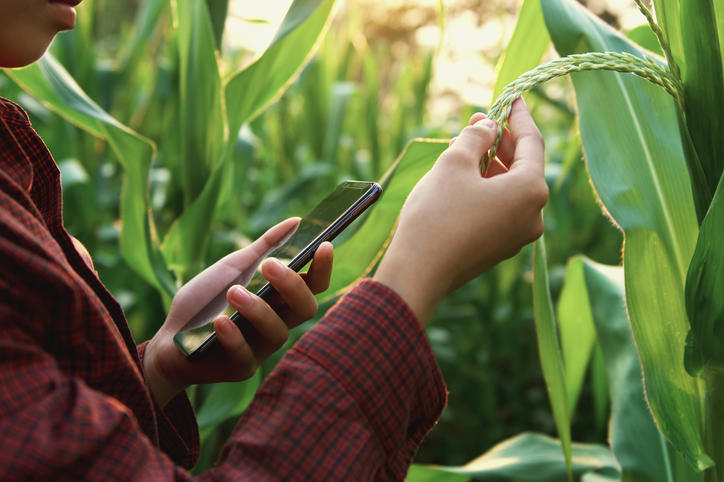
Agricultural education in France: addressing current challenges
The Ministry of Agriculture has published the 2022 edition of its Portrait de l’enseignement agricole (Overview of agricultural education). Agricultural education is present throughout the country and open to the world, and it includes 16 higher education establishments in agronomy, veterinary science and landscape management, 10 of which are public. Each year, these higher education institutions award approximately 2,800 engineering degrees, 600 veterinary degrees, 60 landscaping degrees and 150 State doctorate degrees. Here’s an overview of this education and these training courses that is on the rise!
Face aux défis de souveraineté alimentaire, d’accompagnement des transitions, notamment agro-écologique, de réponse aux besoins des professionnels et des territoires, l’enseignement agricole français "est porteur de réponses avec sa grande capacité à s’adapter aux changements". C’est cette démonstration qu’entend faire le Portrait de l’enseignement agricole qui présente, outre des chiffres clés, des témoignages d'élèves et de professeurs venant illustrer l’excellence de ce domaine de formation en France.
Une insertion professionnelle remarquable
Comme l’écrit en effet le ministre de l’agriculture et de l’alimentation dans sa préface, "au-delà de la garantie de bénéficier d’une formation d’excellence, faire le choix de l’enseignement agricole c’est la garantie d’un emploi d’avenir dans des secteurs multiples qui, chaque année, recrutent". Ainsi, plus le niveau de diplôme est élevé, meilleure est l’insertion professionnelle. Parmi ces formations de niveau supérieur, on trouve les diplômes d’ingénieur, de vétérinaire, de paysagiste et les doctorats d’État, autant de formations qui permettent de "répondre aux problèmes actuels tels que l’alimentation durable, le développement des territoires, la santé et le bien-être des animaux, l’entretien des paysages".
Dans le détail, 80% des ingénieurs entrés dans la vie active sont en emploi six mois après leur sortie de l’école et ce taux atteint 92% un an après la sortie de l’école. Pour ce qui concerne les vétérinaires, la quasi-totalité d’entre eux sont en emploi un an après leur sortie de l’école. Quant à l’insertion professionnelle des paysagistes, elle est généralement caractérisée par un taux d’entrepreneuriat plus important dans le secteur de la conception et de l’aménagement paysager.
L’ouverture à l’international
L’enseignement agricole forme de "futurs professionnels ouverts à l’Europe et au monde, conscients des enjeux internationaux", grâce notamment à une centaine de partenariats de coopération internationale. Ont aussi été constitués, de façon plus formelle, 28 réseaux Europe et International de l’enseignement agricole, couvrant une soixantaine de pays, qui, même pendant la pandémie, ont maintenu "leurs partenariats par des moyens alternatifs et propices aux réflexions sur des coopérations durables".
Même si la dynamique de mobilité de l’enseignement agricole a pu été impactée par la crise sanitaire, plus de 5000 étudiants internationaux ont pu être accueillis dans les établissements agricoles. De même, les 1052 projets Erasmus+ portés par les établissements agricoles entre 2014 et 2020 ont permis aux établissements de "s’emparer du nouveau programme Erasmus+ 2021-2027 et de ses thématiques prioritaires : l’inclusion, la transition écologique, la transformation numérique et l’apprentissage de la citoyenneté européenne".
Des acteurs de la recherche et du développement
Les établissements agricoles sont devenus des acteurs incontournables dans tous les domaines de la recherche et sont désormais des acteurs essentiels du développement.
L’enseignement agricole intervient en effet dans toutes les activités de développement, d’expérimentation et d’innovation agricoles et agroalimentaires.
En partenariat avec les organismes nationaux de recherche et les universités, les établissements de l’enseignement supérieur agronomique, vétérinaire et de paysage conduisent ainsi des travaux de recherche dans différents secteurs comme la gestion durable des ressources, l’adaptation aux changements climatiques, la recherche de la performance sociale, économique et environnementale, la lutte contre de nouvelles maladies infectieuses et la maîtrise de la sécurité et de la qualité des aliments. La recherche réalisée au sein de ces établissements s’appuie notamment sur une centaine d’unités mixtes de recherche, placées sous la responsabilité conjointe d’un établissement de l’enseignement supérieur agricole et de partenaires, tels que l’Institut national de la recherche agronomique et de l’environnement (INRAE), le Centre national de la recherche scientifique (CNRS), l’Institut national de la santé et de la recherche médicale (INSERM).
Des établissements leaders
Afin d’accompagner et de valoriser l’agriculture et l’alimentation de demain, le "système d’enseignement supérieur agricole doit s’adapter". Tel est le constat final dressé par le ministère de l’agriculture qui met en valeur deux ensembles complémentaires placés sous la tutelle du ministère de l’agriculture, membres du Forum de Campus France, qui ont vocation à structurer cet enseignement en France :
-
un établissement leader dans les sciences et industries du vivant et de l’environnement, AgroParisTech, membre d’une université de premier rang international, l’Université Paris-Saclay ;
-
un établissement en pointe sur les questions d’agriculture, d’alimentation et d’environnement, L’Institut Agro composé d’écoles implantées partout en France et fortement ancrées dans les territoires, en lien avec les filières.
A noter que Campus France propose sur ce sujet une fiche d'information détaillée sur les formations en agriculture et en agronomie qui fait le point sur les types de formations proposées en France dans ces domaines (niveau licence, master, post-master).
Related contents
Recommended News




















































